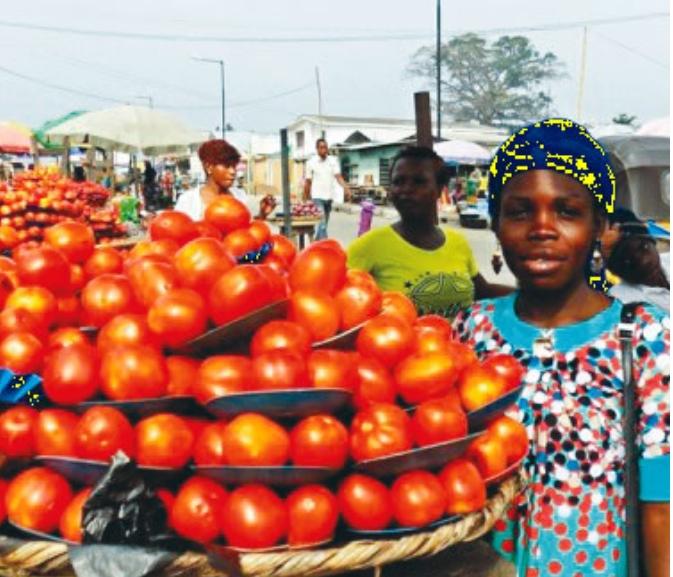Business
Housewives Lament As Tomato Prices Soar

Some housewives in the Federal Capital Territory, Abuja on Sunday said they have ditched tomatoes for their stews and other sauces as cost skyrockets.
The residents, who made this known in an interview with the News Agency of Nigeria, said they have resorted to using garden eggplants and carrots in their stews.
They said garden egg, called “ganyen gauta” in Hausa, “igba” in Yoruba, and “anyara” in Igbo, could blend very well with rice in the same manner as tomatoes.
Others said they were exploring pumpkin, pawpaw, or traditional soups like white soup and palm fruit soup popularly called banga soup in place of tomato stew.
READ ALSO: Pilot Killed As Fighter Jet Crashes During Venezuela Exercise
Mrs Jumai Amodu, a mother of five, said a week without rice with tomato stew was unfulfilling for her and the family.
She said rice with stew was a regular on their menu, adding that “there is an unexplainable satisfaction that comes with taking cooked rice and stew.”
The mother of five, however, said with the scarcity and high cost of tomatoes, her family was exploring garden egg stew.
Amodu said, “Since tomatoes became very expensive, we decided to use garden egg for stew and it is as sweet as tomato stew.
“The only major difference between garden egg stew and tomato stew is the colour.
READ ALSO: China Visits Nigeria With 3 Ships, Strengthens Bilateral Relationship
“We also use pumpkin stew with rice sometimes and although it has its unique taste, it blends well with rice.”
Mrs Helen Omo, a businesswoman, said although tomato stew was an important recipe in almost all homes in Nigeria, its scarcity had made some Nigerians think of alternatives.
“I went to the market yesterday to get some tomatoes for stew and a sizeable bushel, which costs between N2000 and N2500 was being sold for as much as N6500.
“I did not bother to haggle the price because it was way beyond my budget,” she said.
Mr Chinedu, an entrepreneur, told NAN that he enjoyed taking rice with pepper soup or white soup.
“The prices of all foodstuff have gone up but that of tomatoes is outrageous probably because it is tomatoes off-season.
READ ALSO: Soludo’s Call For Relocation Of Investment To Anambra Stirs Controversy
“Besides being expensive, it is very scarce and as a result, we decided to explore other recipes,” he said.
Umar Adamu, a tomatoes retailer in Nyanya market in the FCT, said he had stopped retailing tomatoes for some days due to low patronage.
He said customers were not “patronising him because of the high cost.”
Mrs Rukkaya Umar, Chief Executive Officer, Abraks Farm Produce Nigeria Limited said the primary reason for the scarcity of tomatoes was the high cost of fertiliser.
According to her, many tomato farmers do not grow it because they cannot afford fertiliser, adding that fertiliser was critical to its growth.
Umar also said reliance on seasonal farming was one of the reasons for the scarcity, adding that it was tomatoes off-season.
“Most farmers in Nigeria still do seasonal farming and that is contributing greatly to scarcity of farm produce particularly in their off-seasons,” she said.
NAN reports that a sizeable basket of tomatoes which hitherto sold for about N10,000 now sells for about N35,000 while big baskets cost more.
NAN
Business
Naira Extends Appreciation Against US Dollar

The naira extended appreciation against the dollar at the official foreign exchange market on Wednesday.
The Central Bank of Nigeria’s data showed that the Naira further firmed up on Wednesday to N1,418.26 per dollar, up from N1,419.07 exchanged on Tuesday.
Wednesday’s uptrend represents a slight N0.80 gain against the dollar on a day-to-day basis.
READ ALSO:Naira Records Significant Appreciation Against US Dollar
Meanwhile, at the black market, the Naira remained unchanged against the dollar at N1,480 per dollar on Wednesday, the same rate recorded the previous day.
The development comes as Nigeria’s foreign reserves further rose to $45.62 billion as of January 6th, 2026.
Recall that on Tuesday, the Naira posted a N10.24 gain against the dollar.
Business
Naira Continues Gain Against US Dollar As Nigeria’s Foreign Reserves Climb To $45.57bn

The Naira appreciated further against the United States Dollar at the official foreign exchange market, beginning the week on a good note.
Central Bank of Nigeria data showed that the Naira strengthened on Monday to N1,429.31 per dollar, up from N1,430.85 exchanged on Friday, 2 January 2026.
This means that the Naira gained N1.56 against the dollar on Monday when compared to N1,430.85 last week Friday.
READ ALSO:Naira Records Significant Appreciation Against US Dollar
At the black market, the Naira dropped by N5 to N1480 per dollar on Monday, down from N1475 traded Friday.
The development comes as the country’s external reserves rose to $45.57 billion as of Friday last week.
Business
NNPCL Reduces Fuel Price Again

The Nigerian National Petroleum Company Limited, NNPCL, has again reduced its premium motor spirit price.
In Abuja, on Monday morning, it was gathered that NNPCL retail outlets have reduced their fuel price to N815 per liter, down from N835.
This means that the NNPCL filling stations cut their price by N20.
The fresh price has been implemented at NNPCL filling stations in Wuse Zone 6 and 4 Abuja, Keffi-Abuja Road, and Kubwa Expressway.
READ ALSO:Fuel Price Cut: NNPCL GCEO Ojulari Reveals Biggest Beneficiaries
An NNPCL filling station attendant, who preferred anonymity, told DAILY POST that the new price was implemented on Sunday evening.
However, the N815 per liter is N79 higher than the N739 per liter sold at Dangote Refinery’s backed MRS filling stations nationwide.
DAILY POST recalls that NNPCL on December 19, 2025, cut its price of petrol by N80 to N835 amid a price war among players in the country’s oil downstream sector triggered by Dangote Refinery’s gantry price reduction to N699 per liter.

 News4 days ago
News4 days agoWhat I Saw After A Lady Undressed Herself — Pastor Adeboye

 Headline4 days ago
Headline4 days agoPROPHECY: Primate Ayodele Reveals Trump’s Plot Against Tinubu

 Metro4 days ago
Metro4 days agoArmed Robbers Shot PoS Operator To Death In Edo

 Business3 days ago
Business3 days agoNNPCL Reduces Fuel Price Again

 Metro3 days ago
Metro3 days agoAAU Disowns Students Over Protest

 Metro5 days ago
Metro5 days agoJoint Task Force Kills 23 Bandits Fleeing Kano After Attacks

 Politics5 days ago
Politics5 days ago2027: Rivers APC Pledges To Follow Wike’s Instructions

 Metro3 days ago
Metro3 days agoEdo: Suspected Kidnappers Kill Victim, Hold On To Elder Brother

 Metro3 days ago
Metro3 days agoNine Soldiers Feared Dead In Borno IED Explosion

 Metro2 days ago
Metro2 days agoJUST IN: Court Grants Malami, Wife, Son N500m Bail Each
























